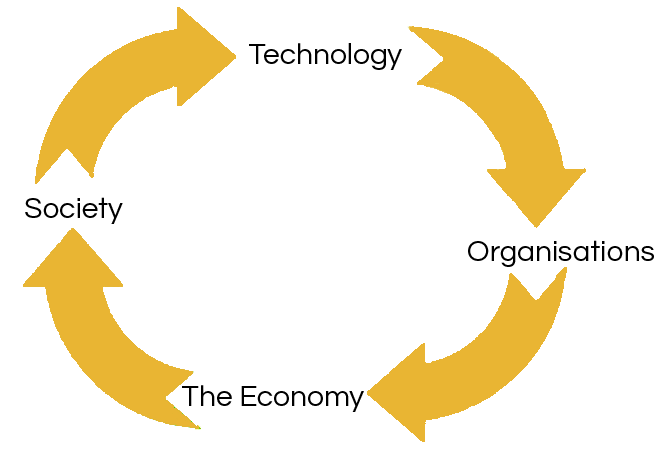The Great Sensor-Era: Brontobytes Will Change Society

Since McKinsey wrote a well-known report about Big Data in May 2011 and called it the next frontier for innovation, competition and productivity, we have come a long way. In the past year 12% of organisations have developed a Big Datastrategy, while 70% of the respondents of a SAS survey said that they were planning or already started a Big Data project. More interesting however, is that 21% don’t know enough about Big Data, while 15% did not understand the benefits of Big Data for their organisation. So, while slowly more organisations are implementing a Big Data strategy, there is still a large part that has no clue about Big Data. When organisations do not understand Big Data, there probably is a large part of the consumers that have no clue about Big Data either.
And that is scary, as Big Data will have a gigantic impact on society, the way organisations are managed and operated, the way the government is organized and subsequently the global economy.
Big Data, as is with most of disruptive technologies happening at the moment, has at first an impact on organisations. The innovators and the early adopters among the organisations are already embracing Big Data. According to the Technology Adoption Cycle this group represents approximately 16% and with 12% having implemented a strategy we are almost bridging the gap to the rest of the organisations. Only when the technology has crossed the chasm, the rest of the organisations, the early and late majority and finally the laggards, will implement a Big Data strategy.
The more organisations that implement a Big Data strategy, the bigger the impact on the economy will be. As the McKinsey report famously states: Big Data can add $ 300 billion potential annual value to US health care, add € 250 billion potential annual value to Europe’s Public sector administration and create a $ 600 billion potential annual consumer surplus. Even more, Gartner predicts that Big Data will drive up to $ 232 billion IT spending through 2016. These are massive gains and investments that of course only occur when all organisations and governments fully start to use Big Data. It does show however the impact of Big Data on the global economy, also when only 12% have started implementing a Big Data strategy.
Obviously, an impact on the economy will affect society. Big Data will bring many quantified-self movement, consumers are able to track and monitor their every move and thus gain a better understanding of their own lives. Many more examples and best practices can be found here.
Big Data however, will also have an affect on the privacy of consumers. Society might become more transparent for consumers; it will also look like if big brother is constantly watching. There are ample examples of where organisations did not respect the privacy rights of consumers or were not clear about how they dealt with the collected data. Last year for example, Path had to admit they had collected data without permission, Twitter sold a multi-billion Tweet archive to a Big Data broker and WhatsApp found itself in the firing line of a joint investigation by both the Canadian and Dutch data protection authorities. In the future when this happens, these organisations probably will be punished severely. Not only by governments or prosecutors but, more importantly, also by consumers who will ban those organisations.
Slowly consumers are starting to understand that, with the new technology, their privacy is under fire. We have already proposed four ethical guidelines how organisations should approach this, but it is only a matter of time before a large and well-needed public debate will start in many countries on how to deal with privacy in a Big Data world. These debates could lead to new legislation imposed by governments resulting in a change in technology. If governments do not impose the changes, consumers could demand organisations to change policies or products and as such change the technologies used.
On the other, more positive, side, society could also be the driver behind new technologies. A great example here is the rise of social media analytics because consumers started to use social networks to connect with each other.
So, like any other disruptive technology, Big Data influences organisations and at the moment the Innovators and Early Adopters are already working on their Big Data strategy. Because organisations are changing the way they are managed and operated, they reap the benefits from it and this impacts the global economy one way or another. Research has shown that organisations that have implemented a Big Data strategy outperform their peers who do not have such strategy with 30%. Consequently, Big Data impacts the society on many different aspects, which in turn can affect the technology.

This ‘Technology-impact-cycle’ is an ongoing cycle. A part from Big Data, it can also be used to discuss the impact for other new technologies and how they affect organisations, the economy and society. In general one rotation of the ‘Technology-impact-cycle’ takes a few years. So, while O’Reily first coined the term ‘Big Data’ in 2005, we only now start to understand the massive impact of it on societies worldwide. Understanding what impact society will have on Big Data is, however, still far away and yet unclear.





